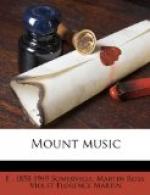“He’s a credit to his breeding, Major!” said the heavy man, indicating Larry with a sandwich from which he had taken a bite of the size of one of his horse’s hoofs; “I wish we had a few more lads coming on in the country like him!”
“What good are they going to do?” responded the Master, reverting to the pessimistic mood that was daily becoming more frequent with him; “what chance is there for a gentleman in this damned country? You might as well have a mill-stone round your neck as an Irish property these times! What do you suppose will be left to us after the next ‘Revision of Rents,’ as they call it?”
“Well, deuce a much indeed,” returned Doctor Mangan, equably, “but it mightn’t be so bad as that altogether! I have my little girl out for the first time to-day, Major. I wonder might I ask your man, that’s looking after your young ladies, to have an eye to her, too?”
Doctor Mangan withdrew with the required permission, and with his daughter at his heels, proceeded through the assembling riders and carriages, distributing greetings as he went.
Doctor Francis Aloysius Mangan was one of the leading doctors in the district of which the towns of Cluhir and Riverstown each felt itself to fill the most important place. Ireland grows doctors and clergymen with almost equal success and profusion. There is in the national character a considerable share of the constituents that are valuable in both professions. Power of sympathy, good-nature, intuition, adroitness, discernment of character, and a gift for taking every man in his humour. Qualities that are perhaps beside the specialised requirements, but are equally indispensable.
In what degree these attributes were bestowed upon Doctor Mangan may gradually be ascertained by the patient reader, but in the case of Father David Hogan, P.P., of Riverstown, at this juncture in lively converse with the Misses Talbot-Lowry, the reader may be spared the exercise of that tiresome virtue, and may feel confident that Father Hogan failed in none of the qualities that have been enumerated. Father David was, indeed, the most popular man in the country with all classes and creeds; he was universally known as the Chaplain of the B.V.H., and was accounted one of the chiefest glories of the hunt. Major Talbot-Lowry was accustomed to boast, in places where such as he congregate, that He, in His country, had the best priest in Ireland! A real good man. Kept the farmers civil and friendly. Managed a district for the Fowl Fund. And a topper to ride—always at the top of the hunt!
“Trust a priest to have a good horse!” is the rejoinder prescribed in such cases, and Major Dick’s fellows seldom failed to comply with the ritual.
Father David, stout, jolly, and, like his namesake, of a ruddy countenance, mounted upon a black mare as stout and sporting-looking as himself, was, as Doctor Mangan drew near to the Misses Talbot-Lowry, beaming upon these two lambs from another fold, and having congratulated Miss Judith on the appearance of the grey mare that she was riding (reft from Lady Isabel and the victoria), was endearing himself to Miss Christian by tales of the brace of hound puppies that he was walking for the hunt.




